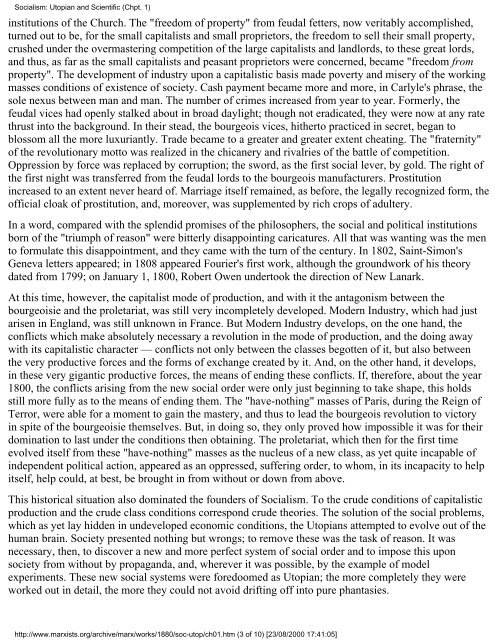Socialism: Utopian and Scientific - MIA
Socialism: Utopian and Scientific - MIA
Socialism: Utopian and Scientific - MIA
Create successful ePaper yourself
Turn your PDF publications into a flip-book with our unique Google optimized e-Paper software.
<strong>Socialism</strong>: <strong>Utopian</strong> <strong>and</strong> <strong>Scientific</strong> (Chpt. 1)institutions of the Church. The "freedom of property" from feudal fetters, now veritably accomplished,turned out to be, for the small capitalists <strong>and</strong> small proprietors, the freedom to sell their small property,crushed under the overmastering competition of the large capitalists <strong>and</strong> l<strong>and</strong>lords, to these great lords,<strong>and</strong> thus, as far as the small capitalists <strong>and</strong> peasant proprietors were concerned, became "freedom fromproperty". The development of industry upon a capitalistic basis made poverty <strong>and</strong> misery of the workingmasses conditions of existence of society. Cash payment became more <strong>and</strong> more, in Carlyle's phrase, thesole nexus between man <strong>and</strong> man. The number of crimes increased from year to year. Formerly, thefeudal vices had openly stalked about in broad daylight; though not eradicated, they were now at any ratethrust into the background. In their stead, the bourgeois vices, hitherto practiced in secret, began toblossom all the more luxuriantly. Trade became to a greater <strong>and</strong> greater extent cheating. The "fraternity"of the revolutionary motto was realized in the chicanery <strong>and</strong> rivalries of the battle of competition.Oppression by force was replaced by corruption; the sword, as the first social lever, by gold. The right ofthe first night was transferred from the feudal lords to the bourgeois manufacturers. Prostitutionincreased to an extent never heard of. Marriage itself remained, as before, the legally recognized form, theofficial cloak of prostitution, <strong>and</strong>, moreover, was supplemented by rich crops of adultery.In a word, compared with the splendid promises of the philosophers, the social <strong>and</strong> political institutionsborn of the "triumph of reason" were bitterly disappointing caricatures. All that was wanting was the mento formulate this disappointment, <strong>and</strong> they came with the turn of the century. In 1802, Saint-Simon'sGeneva letters appeared; in 1808 appeared Fourier's first work, although the groundwork of his theorydated from 1799; on January 1, 1800, Robert Owen undertook the direction of New Lanark.At this time, however, the capitalist mode of production, <strong>and</strong> with it the antagonism between thebourgeoisie <strong>and</strong> the proletariat, was still very incompletely developed. Modern Industry, which had justarisen in Engl<strong>and</strong>, was still unknown in France. But Modern Industry develops, on the one h<strong>and</strong>, theconflicts which make absolutely necessary a revolution in the mode of production, <strong>and</strong> the doing awaywith its capitalistic character — conflicts not only between the classes begotten of it, but also betweenthe very productive forces <strong>and</strong> the forms of exchange created by it. And, on the other h<strong>and</strong>, it develops,in these very gigantic productive forces, the means of ending these conflicts. If, therefore, about the year1800, the conflicts arising from the new social order were only just beginning to take shape, this holdsstill more fully as to the means of ending them. The "have-nothing" masses of Paris, during the Reign ofTerror, were able for a moment to gain the mastery, <strong>and</strong> thus to lead the bourgeois revolution to victoryin spite of the bourgeoisie themselves. But, in doing so, they only proved how impossible it was for theirdomination to last under the conditions then obtaining. The proletariat, which then for the first timeevolved itself from these "have-nothing" masses as the nucleus of a new class, as yet quite incapable ofindependent political action, appeared as an oppressed, suffering order, to whom, in its incapacity to helpitself, help could, at best, be brought in from without or down from above.This historical situation also dominated the founders of <strong>Socialism</strong>. To the crude conditions of capitalisticproduction <strong>and</strong> the crude class conditions correspond crude theories. The solution of the social problems,which as yet lay hidden in undeveloped economic conditions, the <strong>Utopian</strong>s attempted to evolve out of thehuman brain. Society presented nothing but wrongs; to remove these was the task of reason. It wasnecessary, then, to discover a new <strong>and</strong> more perfect system of social order <strong>and</strong> to impose this uponsociety from without by propag<strong>and</strong>a, <strong>and</strong>, wherever it was possible, by the example of modelexperiments. These new social systems were foredoomed as <strong>Utopian</strong>; the more completely they wereworked out in detail, the more they could not avoid drifting off into pure phantasies.http://www.marxists.org/archive/marx/works/1880/soc-utop/ch01.htm (3 of 10) [23/08/2000 17:41:05]














![tyf Enf=O=n]lgg](https://img.yumpu.com/47584932/1/190x245/tyf-enfonlgg.jpg?quality=85)

